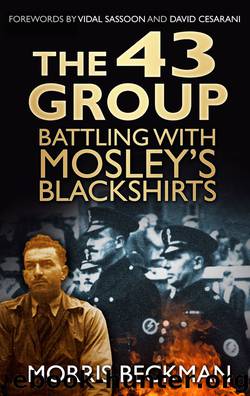The 43 Group by Morris Beckman

Author:Morris Beckman
Language: eng
Format: epub
ISBN: 9780752499796
Publisher: The History Press
Published: 2013-06-19T16:00:00+00:00
Notes
1 Ten successive issues carried profiles of Hamm, Burgess, Battersby, Preen, Raven Thomson, Webster, Lockhart, Leese, Beckett and Marley
2 Sunday 17th August 1947
Chapter Nine
1948 arrived and still the birth of the much vaunted Union Movement had not yet occurred. The street fighting continued. Dialogue between the Jewish Defence Committee (JDC) and the Group waxed and waned, fruitlessly. Some, though not all, members of the JDC were inclined to talk down to the Group from the height of their Establishment status. Hitherto, defence of the Jewish community had been their own prerogative. British Jewry has seldom criticised its Deputies; they are simply there, like the sun during the day and the moon at night.
Originally the JDC had considered the Group to be only a passing thing, ephemeral. But the appearance of the Group newspaper, On Guard, spurred the Committee into another attempt to bring the Group to heel. Its Chairman, Mr Hydleman, and a Mr Lieberman, met with the Group Executive once more. The Executive took up a position to which it adhered thereafter; they would co-operate with the JDC, but only as a separate organisation and with a meaningful representation. Mr Hydleman suggested in reply that perhaps the Group could keep its separate identity for social club purposes only. The reply was succinct: sorry, no deal.
At an ensuing JDC meeting feelings against the Group ran high. It was severely lambasted by several of those present, and it was even suggested that the Jewish press be asked not to accept advertisements by the Group in the interests of the community. Common sense, however, prevailed and this idea was dropped. It was also suggested that those who gave monies to the Group should be made aware that they were not donating to the JDC, in which the Group had no part. Whether this was done is not known, but funds for the Group continued to roll in. On Guard had developed into a potent propaganda weapon, keeping a sharp eye on fascist activity at home and abroad and publicising it.
Then, at last, in March 1948, the event everyone had been waiting for took place. Oswald Mosley brought his Union Movement fully into the open and his final run to gain long desired political power was on. This was four months later than originally planned, but then Mosley had had his problems. The street riots which had raised such a unanimously critical press, and the increasing number of questions in the House hostile to his purpose, had left him uncertain. Also, the ceaseless offensive from the Group had caused internecine quarrelling among the higher echelons of the fascist movement. Then, too, some fascists stubbornly preferred to remain leaders of their own small groups rather than have them swallowed up by the much larger Union where they knew they would be of little account. A scattering of die-hards rebelled against the dropping of the name ‘fascist’. If it had been good enough for Hitler, Mussolini and Franco, it should have been good enough for Mosley, they argued.
Download
This site does not store any files on its server. We only index and link to content provided by other sites. Please contact the content providers to delete copyright contents if any and email us, we'll remove relevant links or contents immediately.
| Anarchism | Communism & Socialism |
| Conservatism & Liberalism | Democracy |
| Fascism | Libertarianism |
| Nationalism | Radicalism |
| Utopian |
The Secret History by Donna Tartt(19052)
The Social Justice Warrior Handbook by Lisa De Pasquale(12187)
Thirteen Reasons Why by Jay Asher(8893)
This Is How You Lose Her by Junot Diaz(6877)
Weapons of Math Destruction by Cathy O'Neil(6265)
Zero to One by Peter Thiel(5786)
Beartown by Fredrik Backman(5737)
The Myth of the Strong Leader by Archie Brown(5500)
The Fire Next Time by James Baldwin(5431)
How Democracies Die by Steven Levitsky & Daniel Ziblatt(5215)
Promise Me, Dad by Joe Biden(5141)
Stone's Rules by Roger Stone(5081)
A Higher Loyalty: Truth, Lies, and Leadership by James Comey(4954)
100 Deadly Skills by Clint Emerson(4921)
Rise and Kill First by Ronen Bergman(4779)
Secrecy World by Jake Bernstein(4741)
The David Icke Guide to the Global Conspiracy (and how to end it) by David Icke(4708)
The Farm by Tom Rob Smith(4502)
The Doomsday Machine by Daniel Ellsberg(4484)
